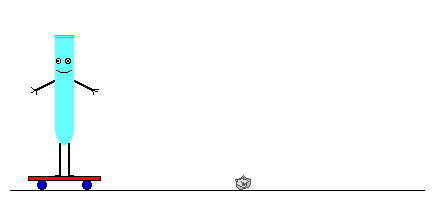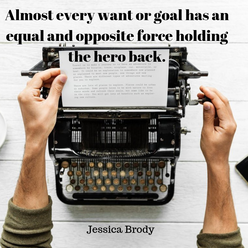|
My mother quoted both Shakespeare and Newton and others I have yet to divine, and as a child, I was completely unaware. It's completely shocking to read a work of great literature, or science, and hear my mother speaking the lines from decades past. When it came to Newton's laws, her recitation tended to follow a complete kid klutz moment. For instance, putting books onto the dining table, push back, spill milk across the dining table. Mom would spout Newton's 3rd law: For every action, there is an equal and opposite reaction. I guess that was better than yelling at us for spilled milk. But here's the thing. Newton's laws apply to people and characters as well as the universe. Newton's law of inertia, states that an object at rest will remain at rest unless acted upon by an outside source. In this example, the object at rest is our character before the story begins. Jennifer Brody, in Save the Cat! Writes a Novel, writes: [momentary pause wherein I acknowledge my mother's genius] In this analogy, the character is the object at rest. The character is living their happy or unhappy life in stasis, or as Christopher Vogler (The Writer's Journey) calls it, the Ordinary World. The character may be unhappy, but they're not unhappy enough to move. Take Luke from the original Star Wars. He's completely unhappy working for his uncle on the farm at the far end of the universe, but he's there anyway, plugging along, dreaming about leaving, "some day." He has the desire, but not the actionable force. It takes a droid, a crazy old hermit, and the death of his aunt and uncle to "force" him from his Ordinary World. Vogler called this the Call to Adventure, but in Brody's version, the events that take place are the equal and opposite force that compel the object at rest into an object in motion (or, a Character in Motion). Once the character is in motion, their wants and goals keep the plot moving. When a hero wants something, it sets them in motion. It gets them off their butt and into the action (Brody 13).  As the story progress, the equal and opposite force that Brody discusses can come to life through either conflict or a nemesis (antagonist). It is the equal and opposite force that acts against the character in motion. It's the question "[w]hat is standing in the hero's way?" The force standing in the hero's way must be strong enough to push him off course. For instance, think about what it took to force the Millennium Falcon close enough to the Death Star to get captured? And yet, isn't that where Luke and Han were destined to go? Think about your current work in progress (WIP).
I never stopped to consider that something in science, one of my least favorite subjects, could impact my writing world. That was a deficit in my viewpoint. Everything in the world and on our planet can impact our writing world. From years ago, my mother was teaching me how to apply universal laws to my life, and I am the better for it. Now, if I could just find that outside force to get the rest of my life in motion.
0 Comments
|
AuthorWriter, college professor, lover of story, fan of all things bookish. Plus chocolate, because who doesn't love chocolate. Archives
August 2019
Categories
All
|

 RSS Feed
RSS Feed